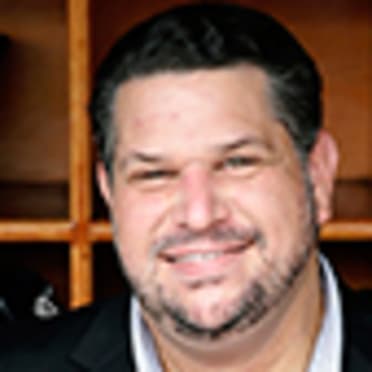Is Votto a HOFer? The answer is unanimous
Reds first baseman Joey Votto's resurgence as an offensive force has reignited the conversation about his eventual Hall of Fame candidacy. For this group of MLB.com reporters, there really is no debate -- Votto is destined for Cooperstown, and he shouldn’t have to wait that long for the call.
Alyson Footer, editor/moderator: We’ve watched Joey Votto put together many seasons that made us feel like he was on a Hall of Fame trajectory, but I think most of us looked at his past couple seasons, and his age (he turns 38 on Sept. 10) and figured his best years are behind him. And then, BAM! He’s been tearing the cover off the ball in the second half of the season. This is the long-winded way to say that there’s never been a better time to debate his HOF candidacy. Before I get into specifics: yes or no? Is Votto a Hall of Famer?
Mark Feinsand, executive reporter: Yes. That was easy.
Mark Sheldon, Reds beat reporter: Yes, I believe so.
Anthony Castrovince, reporter: Duh.
Footer: I am a solid "yes" as well.
The more time that passes, hit and homer totals are much less of a factor when a voter is weighing a player’s candidacy. Specifically 3,000 hits and 500 homers -- while still notable milestones, are not requirements to gain election. So the fact that Votto just logged his 2,000th hit should not be a deterrent to say he’s more of a bubble candidate.
Here’s one argument: He led the NL in on-base percentage seven times, and he almost had one more, if not for Bryce Harper beating him out by a point several years ago, .460 to .459. That's what a lot of voters will be looking at when it comes time to vote, right?
Feinsand: Absolutely. Voters in ye olden days didn’t appreciate OBP the way voters do now. Seven OBP titles probably means more to current voters than seven batting titles would … but in case there are still some old-school voters who look at batting average, he’s a .303 career hitter, too.
Sheldon: I think one of the cooler parts of his numbers arguments is that he's currently above the .300/.400/.500 plateau for his career. And he's done that for 15 years and counting.
Castrovince: That is pretty cool. This is a good way to put it in perspective. Votto debuted in 2007 and has a career OBP of .417, as of this writing. The league OBP in that time is .323. So we're talking about almost 100 points higher.
Footer: A lot of us are conditioned to this argument: "If he was dominant at his position for a 10-year stretch, that's a good indication that's he's a Hall of Famer.” Yet then when it comes time to vote for something that fills that criteria, there seems to still be a fair amount of naysayers. Votto was one of the best first basemen 10 years running. That should seal it.
Sheldon: In OPS -- he's led the Majors twice. For career OPS, Votto is ahead of a lot of Hall of Famers ... Mike Schmidt, Hank Aaron, Frank Robinson, Chipper Jones and more.
Feinsand: But Votto has also led the league in slugging percentage, has seven seasons with 25-plus home runs, a whole bunch of years with a .900-plus OPS, etc. He’s a great hitter who has been consistently great for much of his career. And he’s also played 140+ games in nine seasons, which we don’t see a whole lot anymore.
Footer: Votto is currently tied for 138th on baseball’s all-time list for times on base. He's already ahead of several HOF first basemen, including Willie Stargell. And he's still an active player -- plenty of time to pile up more.
Feinsand: Votto wasn’t just one of the best first basemen for a 10-year stretch; he was one of the best PLAYERS in the game for a decade. The dude led the league in OBP almost every year in the 2010s.
Sheldon: Votto suffered a pretty significant knee injury in 2012 -- when he was in the midst of what could have been a second NL MVP season. He wasn't the same the rest of that season, '13, and really sank in '14. But then he was back to his "more normal production" until he cratered in '19.
Feinsand: From 2010-19, he slashed .306/.428/.516 (.944 OPS) … that’s ridiculous. And he was 35 when that period ended, too. Also, he averaged 109 strikeouts and 105 walks during that decade. A 1-to-1 K/BB ratio in this era is almost unheard of.
Sheldon: Votto knew the strike zone better than the umpires, quite often.
Feinsand: With a hat-tip to C. Trent Rosecrans and Jayson Stark at The Athletic, the only players in history to lead the league in OBP seven times in their career were Ted Williams, Babe Ruth, Barry Bonds, Rogers Hornsby, Ty Cobb and Votto. That’s silly.
Castrovince: So much of this comes down to how you perform relative to your era. He has played in an increasingly high-strikeout era in which the rate is now nearing 25 percent. He has struck out in 18 percent of his career plate appearances.
Feinsand: Votto will wind up with roughly the same number of hits as HOFers like Mike Schmidt, Harmon Killebrew and Willie McCovey. Yes, those guys had more home runs, but Votto’s overall resume stacks up against any of them.
Sheldon: Ultimately, the anti-Votto argument for the HOF will come down to what he didn't do -- especially signing his mega contract. The Reds have been to the postseason only four times (2010, '12, '13, '20) and won zero playoff series. I'm not saying he should be blamed for that. But that's also a resume builder for some voters, I'd presume.
Feinsand: As a HOF voter myself, I don’t penalize players for not winning in the postseason. Players who thrived in October can most definitely help their cases, but the idea that the Reds didn’t win in October because of Votto alone is ludicrous.
Castrovince: Votto's WAR per 162 games played is 5.5 -- identical to that of Albert Pujols, who I'm pretty sure most people would say is a first-ballot Hall of Famer.
Footer: Mark Sheldon, you've covered him his entire career and you know him better than all of us. Do you recall at what point you watched him play and said, "I think he's got a real shot at the Hall"?
Sheldon: I probably thought about it at times, but it really hit home during his 2017 season. He was incredibly close to winning another MVP.
Castrovince: That 2017 MVP vote was a big whiff. Votto was robbed.
A second MVP certainly would have helped make Votto more of a slam dunk for some Hall voters, but I'd say that 2017 season was when his case started to solidify for me, too. He played all 162 games that season and got on base 321 times -- an average of almost twice per game!
Feinsand: I first thought of Votto as a potential Hall of Famer when he came to accept his NL MVP award at the 2011 BBWAA dinner in New York. I was the emcee that year, and that guy had the best, sharpest tux I had ever seen. He just screamed Hall of Famer.
Sheldon: Postseason doesn't matter for Feinsand's vote, sartorial issues do.
Feinsand: Seriously, though, we all look at OBP as being more important than average at this point, and there has been no better on-base guy in the past 15 years than Votto. He took the baton from Bonds, only without all the controversy.
Sheldon: Votto was the best of this era at not making outs.
Feinsand: Mix in his power and production and he’s put together a strong case for Cooperstown.
Sheldon: No question. It wasn't always sexy, but he gets on base better than anybody.
What's amazing to me now -- when he got benched last season for three games, he totally overhauled his approach after watching video of Mike Trout, Ronald Acuña Jr., Mookie Betts and other younger players. Worried less about swinging at the perfect pitch and accepted more failure. And it worked. Who can do that at 36 or 37?
Feinsand: He has 10 seasons with 30-plus doubles in addition to the home runs I mentioned earlier. It’s not like he is simply a walk machine.
Footer: But, part of the "knock" on Votto over time was about how much he walked. This was a source of contention with the Reds’ longtime radio announcer, Marty Brennaman. Marty felt like a slugger being paid to hit should hit more.
I feel like the Reds' lineup -- which lacked pop a lot of Votto's prime years -- contributed to this perception. As an example, in Houston, Jeff Bagwell walked just as much, but he was lauded for that because most of the time, the Astros had some big-time thumpers hitting behind him. Criticizing too many walks is like criticizing someone for getting on base, which seems silly, no?
Feinsand: Yes. All due respect to Marty, but that argument is absurd.
Castrovince: That criticism hounded him for years in Cincinnati. I asked him about it once, and he said, "I think my style of play challenges people to think outside the box, and it challenges people to go against their former ideas of what a good player looks like.”
Sheldon: I am a friend of Marty's, but I've felt that his view was off on Votto. I will say that Votto's changed approach does fit in more with Marty's thinking, though.
Castrovince: Yes, it's interesting, because, for as much conviction as he had in his disciplined approach, particularly as his power waned in the mid-2010s, Votto recognized last year that it was time to "sell out" for more power. I'm happy he's been able to go on this second-half surge as a result, because it pads the Hall case and makes some of those doubters happy with the overall resumé.
Feinsand: Votto has been in the Top 10 in runs scored in his league six times during his career. Isn’t that the point of the game? To score runs?
Had he been hitting in front of the guys Bagwell had behind him, Votto would have scored even more runs.
Sheldon: When Votto and Shin-Soo Choo were teammates in 2013, they were 1-2 in OBP. They had Jay Bruce and Brandon Phillips behind them to drive them in. After that, not so much. There were a few big run producers over the years -- Adam Duvall comes to mind. But not enough over the more recent years.
Feinsand: I give Votto credit for this: His OBP dropped sharply in 2019-20, so he knew he had to make up for it somewhere. Had he still been putting up .430 OBPs in those years, I’m not so sure he would have changed anything.
Footer: So we're all in agreement that he is a Hall of Famer. I guess the only question remains -- how many years will he be on the ballot until he's elected? And for the record, I hate that players spend years on the ballot before they get in. You're either a Hall of Famer, or you're not.
Sheldon: I agree with you, Alyson. But realistically, I do think his case will have to build over time and attrition of voters. I could see him taking 5-plus years.
Feinsand: He won’t be a first-ballot guy despite the fact that I will vote for him. I’d guess he’s on there for 2-3 years before getting in. A lot of it could depend on who else is on the ballot with him. The guys who have been jamming up the ballot for the past 8-9 years will all be gone by then.
Sheldon: When older-school voters give way to newer-school, Votto's chances will accelerate.
Feinsand: That’s already happening.
Castrovince: I actually think he gets in quickly. His contract runs through 2023. If that happens to be his final season, he's on the 2029 ballot. That's a lot of voter turnover between now and then, and a heightened awareness of the value of Votto.
Feinsand: I think Castro may be right. By the time he’s on the ballot, there will have been turnover, plus we’ll have 12 months of “Why Joey Votto should be in the Hall of Fame” stories leading up to that vote, which will help lay out his case. As a matter of fact, I’m nominating Sheldon to write that one.
Sheldon: I think I will actually have a HOF vote by '29. I would write that story. It's been enjoyable to witness Votto's career.
Castrovince: If anything, I hope Votto can open eyes to the value of the case of other guys. This only applies to the small committees, but look at Dwight Evans as another example of a guy with more than 2,000 hits and more than 1,200 walks who probably hasn't gotten the love his career deserved.



